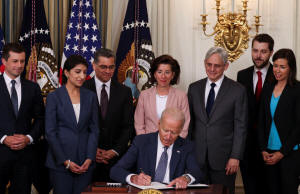Biden signs order to tackle corporate abuses across U.S. economy
 Send a link to a friend
Send a link to a friend
 [July 10, 2021] By
Nandita Bose, Jarrett Renshaw and Diane Bartz [July 10, 2021] By
Nandita Bose, Jarrett Renshaw and Diane Bartz
WASHINGTON (Reuters) -President Joe Biden
signed a sweeping executive order on Friday to promote more competition
in the U.S. economy, urging agencies to crack down on anti-competitive
practices in sectors from agriculture to drugs and labor.
If fully implemented, the effort will help lower Americans' internet
costs, allow for airline baggage fee refunds for delayed luggage, among
other steps.
The order instructs antitrust agencies to focus on labor, healthcare,
technology and agriculture as they address a laundry list of issues that
have irritated consumers, and in the case of drug prices, has bankrupted
some.
"No more tolerance of abusive actions by monopolies. No more bad mergers
that lead to massive layoffs, higher prices and fewer options for
workers and consumers alike," Biden said at a White House signing
ceremony.
The president noted areas where advocates feel that prices are too high,
wages are tamped down or new businesses excluded from competition. "Let
me be very clear, capitalism without competition isn't capitalism, it's
exploitation," he said.

The White House says the rate of new business formation has fallen by
almost 50% since the 1970s as large businesses make it harder for
Americans with good ideas to break into markets.
Biden's action goes after corporate monopolies across a broad swath of
industries, and includes 72 initiatives he wants more than a dozen
federal agencies to act on.
Lower wages caused by lack of competition are estimated to cost the
median American household $5,000 per year, according to a White House
fact sheet that cites research from the American Economic Liberties
Project - an influential Washington-based anti-monopoly group.
The initiatives will no doubt kick off a series of fights with the
affected industries.
The powerful U.S. Chamber of Commerce issued a statement saying the move
"smacks of a 'government knows best' approach to managing the economy"
and pledged to "vigorously oppose calls for government-set prices,
onerous and legally questionable rulemakings, efforts to treat
innovative industries as public utilities, and the politicization of
antitrust enforcement."
INTERNET, HEARING AIDS
Among the administration's plans to open up the U.S. economy are new
rules to mandate ending excessive internet contract termination fees,
allow hearing aids to be sold over the counter and end non-compete
clauses for millions of workers and many occupational licensing
requirements.
Biden's order pushes the Agriculture Department to act to stop what the
White House called "abusive practices of some meat processors," reacting
to farmers and ranchers who sometimes say they face too few buyers for
their animals.
[to top of second column] |

President Joe Biden signs an executive order on "promoting
competition in the American economy" as members of his Cabinet
standby during an event in the State Dining Room at the White House
in Washington U.S., July 9, 2021. REUTERS/Evelyn Hockstein

The administration also seeks to make it easier for customers to switch banks
and take their transaction data with them, and restore net neutrality rules that
require companies to treat all internet services equally.
Reuters first reported Biden's plan to issue a competition executive order in
late June and subsequently published stories on how it will impact industries
such as farm equipment manufacturers, banking, rail and sea shipping.
The executive order will direct the Department of Justice and Federal Trade
Commission (FTC) to carefully review mergers, and to challenge prior deals that
have closed.
It directs the FTC to issue rules to address competition concerns from Big Tech
companies, Facebook, Apple, Alphabet's Google and Amazon, and limit "killer
acquisitions" where large internet platforms acquire potential competitors.
FTC Chair Lina Khan and the acting head of the U.S. Justice Department Antitrust
Division, Richard Powers, said Friday that they would soon launch a review of
merger guidelines to determine if they are "overly permissive."
On prescription drugs, it aims to lower prices for consumers by allowing
importation of drugs from Canada, where they are cheaper. It also urges the
Department of Health and Human Services to draw up a plan to fight high drug
prices, and gouging.
Evercore/ISI analyst Michael Newshel said in a research note that the impact of
allowing imports from Canada on pricing would be limited given Canada's limited
drug supply and that Canada has indicated in the past that it would not
cooperate with any program. He said the government's decision to turn to
executive orders on drug pricing was surprising given ongoing legislative
efforts in Congress.

The executive order also establishes a White House Competition Council, led by
the Director of the National Economic Council and including many cabinet
secretaries, to monitor progress.
(Reporting by Nandita Bose, Jarrett Renshaw and Diane Bartz in Washington;
Additional reporting by Caroline Humer and David Shepardson; Editing by Alistair
Bell)
[© 2021 Thomson Reuters. All rights
reserved.] Copyright 2021 Reuters. All rights reserved. This material may not be published,
broadcast, rewritten or redistributed.
Thompson Reuters is solely responsible for this content. |